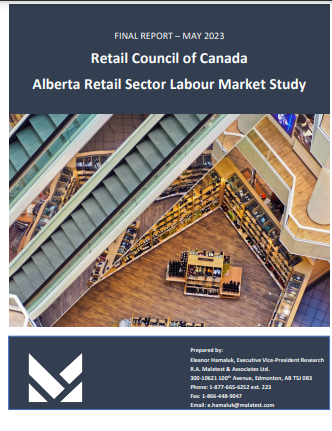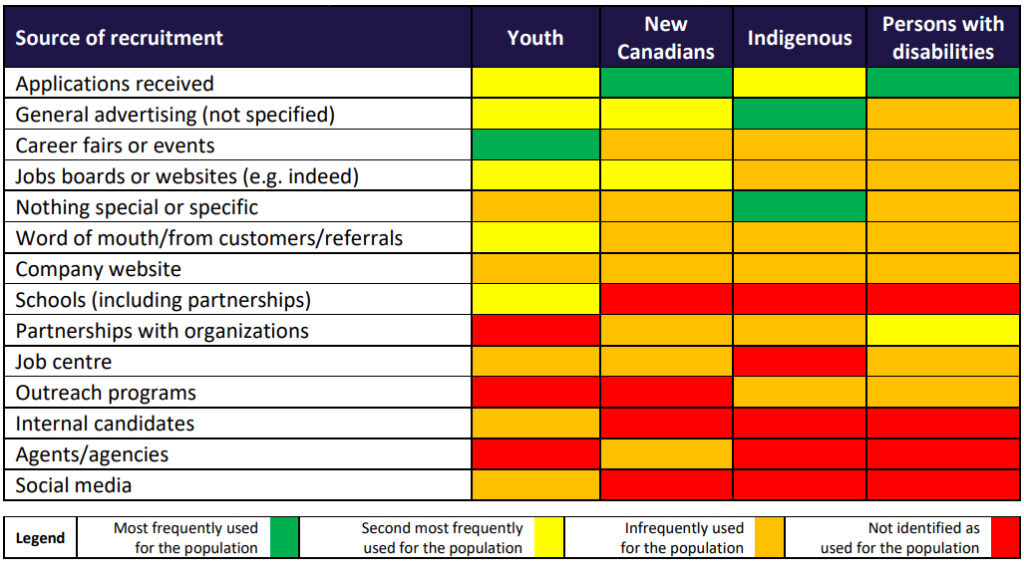
One of the highest priorities for RCC members is retaining sufficient human resources through the implementation of effective recruitment and retention strategies. As the industry continues to grow, and Canada’s economy improves, it is anticipated that current labour needs will only increase.
In Alberta alone, the province’s retail sector will continue to experience significant labour demands, with a total workforce need over the next five years (vacancies, replacement hiring, and demand expansion) exceeding 62,100 positions, which is the equivalent of requiring more than one-quarter (26.9%) of the sector’s current (2022) workforce by 2027.
To understand the full scope of challenges facing Canada’s retail sector, RCC in partnership with the Government of Alberta conducted a comprehensive labour market information study. While Alberta-centric, the belief is that the insights help support the needs of Canadian retailers across the country.
R. A. Malatest & Associates Ltd was retained to conduct a labour market information study that has helped to identify key labour market challenges, best practices in recruitment and finally help inform future industry planning and government policy development.
View the 35-page review here and find some of the key findings below.
5 Defining Themes

Alberta’s youth are not well-prepared for a career in retail
The report found Alberta’s high school graduates are generally not well prepared to work in the retail sector. High school students appear to be lacking sector-relevant skills, such as basic financial, numeracy, computer and life skills, interpersonal skills and decision-making skills. While these gaps are addressed, to some degree, at the college level, Alberta’s ongoing preoccupation with the oil and gas industry mean that students’ preparation for other careers, such as those in retail, remain under-supported. In addition, there appears to be a disconnect between the retail sector and educational institutions that might promote retail careers through programming and internships. For example, very few employers reported that they participated in educational programming, as advisors or mentors, for courses related to business and management.
Identified Gaps in Applicants’ Skillsets as Barriers to Recruitment and Retention in Retail


Retail is not perceived as a long-term career option
Findings from this study reinforce the fact that there is a gap in understanding of retail as a career opportunity. Employers recognize that retail is perceived as low-paying, menial work, with poor work/life balance and little reward. This gap in understanding is compounded by misconceptions of the sector as merely a stepping stone to a ‘real career’. In addition, frontline retail employees appear to be missing key skillsets that would support those looking to pursue retail as a career, including leadership, communication and teamwork skills. Employers who participated in this study emphasized a desire for the sector to have more resources to promote retail as a career at both high school and college levels.

There are barriers to retail-specific recruitment and retention
Employers participating in the study identified a range of barriers that negatively impact frontline retail and management alike. Most notably, starting salary or wages, shift schedule requirements, career earing potential, salary increase and (a perceived lack of) career progression are all considered to negatively impact frontline employees and managers. While some of the barriers were understood to exist, many employers felt that these were, in part, long-standing misconceptions about the retail sector.
Degree to Which Retail-Specific Factors Are Barriers to Recruitment and Retention

Retail does not offer comprehensive training and professional development

Alberta’s retail sector, on the whole, does not offer comprehensive or standardized training or professional development to support frontline employees progress beyond entry level positions. While employers typically provide some internal training opportunities, external training is often costly (to either the employer or employee), time consuming and may not be locally available; smaller employers, in particular, are challenged to provide paid time for employees to participate, since it means they are receiving pay for time spent ‘off the floor’. Despite challenges in offering training and professional development opportunities, employers recognized the joint benefit of supporting employees through training: in addition to understanding that training is an important contributor to staff feeling appreciated and motivated, they also recognized that when staff are well-trained, they are more efficient and effective in their work.
Internal and External Professional Development Opportunities Offered to Retail Workers


There is a gulf between frontline and corporate management
While employers reported that it is common practice to promote frontline employees into frontline management positions (e.g. floor supervisors), it is far less common for frontline employees to ‘work their way up’ into corporate management. Indeed, many employers reported that senior-level management positions are typically filled by external candidates.
Findings from this study indicate that, while youth, new Canadians and, to a lesser degree, Indigenous persons, are highly represented in frontline retail positions, they are under-represented in management positions. This is not surprising, if retail is considered only as a stepping stone to a career in another sector.
Top Study Recommendations
To meet this demand, Alberta’s retail trade sector faces the daunting challenge of finding enough workers to both fill existing vacancies and meet replacement demand. The study concludes that to address these challenges, a radial shift in recruitment and retention practices is required and makes the following recommendations

Rebranding retail as a viable career option
Alberta’s retail sector is challenged by the lack of qualified employees who have the skills necessary to successfully work as frontline retail staff and the
buy-in to do what is necessary to become management. First and foremost, this requires an understanding of retail as a career and not just as a stopgap to ‘something better’. The findings of this study clearly indicate the need for Alberta’s sector to rebrand, in order to capture the interest of qualified, committed individuals who are looking for a long-term career.

Intentionally targeting advertising and marketing to minority populations
Employers did not appear to undertake specific or targeted recruitment activities aimed at under-accessed populations through the survey. Specifically, employers did not describe participating in targeted recruitment efforts aimed at youth graduating high school or college, new Canadians, Indigenous persons or persons with a disability. Efforts should be made to develop sector-level marketing and promotion targeted to attracting under-represented populations. It is important to note that use of the Temporary Foreign Worker (TFW) did not appear to be a useful solution to meeting hiring needs, as the process was too cumbersome, time-consuming and, by its very definition, temporary.
Employers Reported Targeted Recruitment Methods for Minority Populations


Investing in employees: Enhanced salaries, comprehensive benefits packages, and paid training
The study suggests that Alberta’s retail sector begins to offer competitive employment packages to its spectrum of employees – including entry-level positions. Retail compensation must become more attractive in order to compete with other lower-skilled employment opportunities in Alberta.
Training and mentorship that ‘bridge the gap’ between frontline work and upper management

While employers recognized that it was not necessary to have a college degree to work in entry-level retail positions, they also conceded that retail was a cut-throat industry and that employees with college-level understanding (for example, of retail as part of a supply chain) would be more likely to advance into entry-level management positions. Although this was seen to be the case, there appeared to be a disconnect between those that moved from frontline retail to frontline management (e.g. floor supervisor or manager) into higher corporate management positions within a company; indeed, employers stated that the majority of upper level management were hired externally rather than being promoted from within their organization.
Retail Council of Canada would like to thank the integral support of all participants in this research, and our valued funding partners:
Primary Funding Partner:
The Province of Alberta is working in partnership with the Government of Canada to provide employment support programs and services.


For questions or more information contact
John Graham
Director, Government Relations (Prairies)
jgraham@retailcouncil.org
204 926-8624
